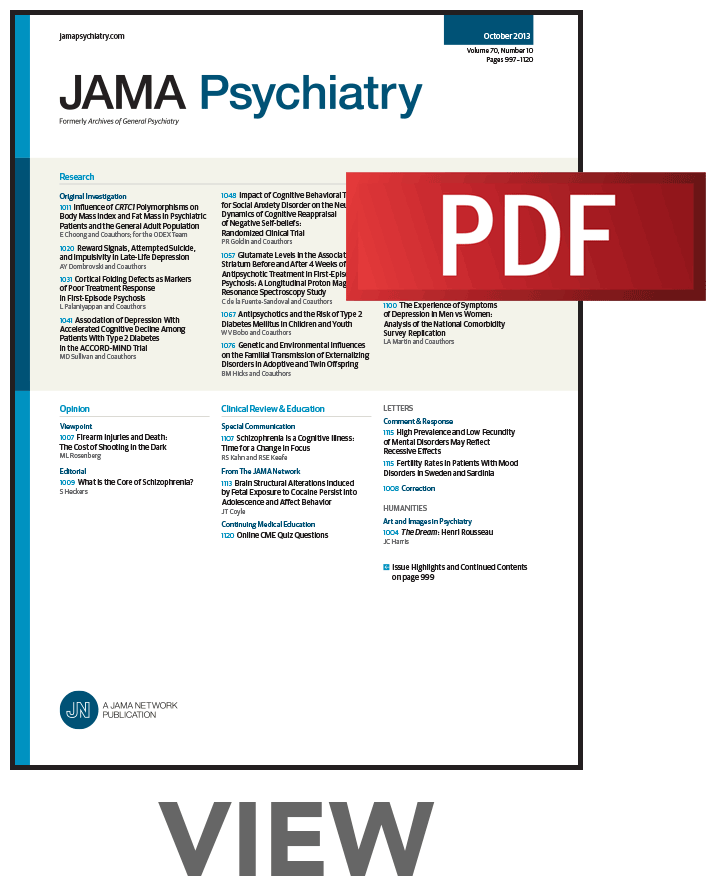跨性别和非二元性人群的心理健康结果:一项综述。
IF 17.1
1区 医学
Q1 PSYCHIATRY
引用次数: 0
摘要
被性别少数群体边缘化的经历可能使他们的心理健康状况比他们的顺性别同龄人更差。了解跨性别者(trans)和非二元性别者的心理健康状况是解决性别少数群体在结果上潜在不平等的重要一步。目的对跨性别和非双性恋人群的心理健康和神经发育状况进行综述,以描述流行病学、关键主题和研究空白。从研究开始到2023年8月21日,我们系统地检索了三个文献数据库(Embase、MEDLINE和PsycINFO),以确定关于跨性别和非双性恋人群心理健康和神经发育结果的综述。文章由2位审稿人筛选,并提取预先指定的数据。根据AMSTAR2标准对纳入评论的质量进行评价。在7496条独特记录中,41条符合纳入标准,在排除重叠的主要研究后合成了24篇综述。从荟萃分析中确定了5种结果的合并患病率估计:自杀意念(50%;95% CI, 42-57),自杀企图(29%;95% CI, 25-34),非自杀性自伤(47%;95% CI, 40-54),饮食失调(18%;95% CI, 16-19)和自闭症谱系状况(11%;95% ci, 8-16)。比较跨性别和顺性别人群的荟萃分析报告自杀意念的几率更高(优势比[OR], 3.48;95% CI, 2.41-4.91),自杀企图(OR, 3.45;95% CI, 2.40-4.64),非自杀式自伤(OR, 3.42;95% CI, 1.99-5.89)和创伤后应激障碍(OR, 2.52;95% ci, 2.22-2.87)。在比较跨性别、顺性别或一般人群的所有叙事综合中,除了问题赌博之外,报告的结果更差,因为有限的证据基础相互矛盾。没有综述评估发病率或死亡率,对非二元性人群或特定性别亚组(如变性男性和变性女性)的分类也有限。评审质量普遍较差。回顾强调了性别认同和结果确定定义的异质性,以及缺乏代表性的样本群体作为主要研究的局限性。结论和相关性越来越多的证据表明,变性人的心理健康状况比顺性人差,但现有文献中存在实质性的差距和方法上的弱点。需要采用交叉视角、使用纵向数据并反映性别少数群体人口的多样性和多重劣势经验的研究,以确保循证政策和保健服务发展。本文章由计算机程序翻译,如有差异,请以英文原文为准。
Mental Health Outcomes in Transgender and Nonbinary People: An Umbrella Review.
Importance
Experiences of marginalization by gender minority people may predispose them to poorer mental health outcomes than their cisgender peers. Understanding mental health conditions in transgender (trans) and nonbinary people is an essential step in addressing potential inequities in outcome for gender minority people.
Objective
To synthesize reviews of mental health and neurodevelopmental conditions in trans and nonbinary people to describe epidemiology, key themes, and research gaps.
Evidence Review
Three bibliographic databases (Embase, MEDLINE, and PsycINFO) were systematically searched from inception to August 21, 2023, to identify reviews addressing mental health and neurodevelopmental outcomes in trans and nonbinary people. Articles were screened by 2 reviewers and prespecified data were extracted. Quality of included reviews was appraised against AMSTAR2 criteria.
Findings
Of 7496 unique records, 41 met inclusion criteria with 24 reviews synthesized after excluding those containing overlapping primary studies. Pooled prevalence estimates from meta-analyses were identified for 5 outcomes: suicidal ideation (50%; 95% CI, 42-57), suicide attempts (29%; 95% CI, 25-34), nonsuicidal self-injury (47%; 95% CI, 40-54), eating disorders (18%; 95% CI, 16-19), and autistic spectrum conditions (11%; 95% CI, 8-16). Meta-analyses comparing trans and cisgender groups reported higher odds of suicidal ideation (odds ratio [OR], 3.48; 95% CI, 2.41-4.91), suicide attempts (OR, 3.45; 95% CI, 2.40-4.64), nonsuicidal self-injury (OR, 3.42; 95% CI, 1.99-5.89), and posttraumatic stress disorder (OR, 2.52; 95% CI, 2.22-2.87). Worse outcomes were reported across all narrative syntheses comparing trans and cisgender or general population groups, except for problem gambling, where the limited evidence base was conflicting. No reviews assessed incidence or mortality, and there was limited disaggregation of nonbinary people or by specific gender subgroups (eg, trans men and trans women). Review quality was generally poor. Reviews highlighted heterogeneity in definitions of gender identity and outcome ascertainment, and unrepresentative sample populations as limitations of primary studies.
Conclusions and Relevance
A growing body of evidence suggests trans people experience worse mental health outcomes than cisgender people, but there are substantial gaps and methodological weaknesses in existing literature. Research applying an intersectional lens, using longitudinal data and reflecting diversity and the experience of multiple disadvantages in the gender minority population is required to ensure evidence-informed policy and health service development.
求助全文
通过发布文献求助,成功后即可免费获取论文全文。
去求助
来源期刊

JAMA Psychiatry
PSYCHIATRY-
CiteScore
30.60
自引率
1.90%
发文量
233
期刊介绍:
JAMA Psychiatry is a global, peer-reviewed journal catering to clinicians, scholars, and research scientists in psychiatry, mental health, behavioral science, and related fields. The Archives of Neurology & Psychiatry originated in 1919, splitting into two journals in 1959: Archives of Neurology and Archives of General Psychiatry. In 2013, these evolved into JAMA Neurology and JAMA Psychiatry, respectively. JAMA Psychiatry is affiliated with the JAMA Network, a group of peer-reviewed medical and specialty publications.
 求助内容:
求助内容: 应助结果提醒方式:
应助结果提醒方式:


